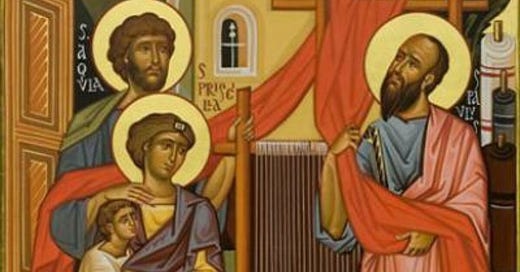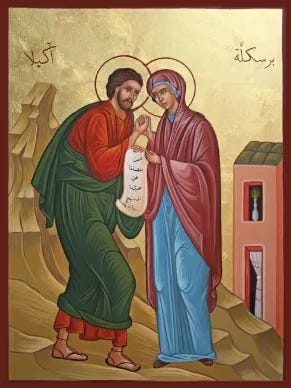"Paul stayed in Corinth for some time after that, then said good-bye to the brothers and sisters and went to nearby Cenchrea. There he shaved his head according to Jewish custom, marking the end of a vow. Then he set sail for Syria, taking Priscilla and Aquila with him."
"When Priscilla and Aquila heard him preaching in the synagogue, they took him aside and explained the way of God even more accurately."
- Acts 18:18 & 26
"Give my greetings to Priscilla and Aquila, my fellow workers in Christ."
- Romans 16:3
When I first planned this series, Men in the Early Church, I was worried I might be accused of man-hating. (I certainly have been in the past.) When talking about men, religion, and the harm done by the church, it’s hard not to focus on the ways masculinity has hurt people.
That said, I believe in separating masculinity from men themselves.
That’s not to say that we’re going to have a “not all men” conversation. All men are responsible for interrogating how and when they may have participated in harmful patriarchal practices. However, I think it’s vitally important to highlight men who have bucked the norm and stood alongside women.
Men like Priscilla’s husband, Aquila.
In reclaiming the Divine Feminine, healthy men are crucial co-workers, leaders, and comrades—just as they were in the very beginning.
Priscilla and Aquila are named six times in the New Testament, primarily associated with Paul’s ministry and travels. According to scripture, they were a Jewish couple expelled from Rome under Christian persecution, eventually settling in Corinth. They were tentmakers, as was Paul, which may be how they first encountered the prolific apostle.
Paul’s relationship with them is especially prominent in the book of Acts, which says that Paul both lived and worked with them, in addition to their ministerial relationship. At some point in their work together, they traveled as far as Syria to preach Christ’s message. There, the author of Acts says that, upon hearing Paul preach publicly, “they took him aside and explained the way of God even more accurately." This snippet of scripture has convinced many over the years that Priscilla and Aquila were mentors of Paul’s. He greets them by name in his letter to the Romans and offers their greeting to the church in Corinth, suggesting that they maintained a relationship for years to come.
Priscilla and Aquila are fascinating characters in the New Testament for a number of reasons. First, they show us that Paul did not work alone, but rather likely had a number of “fellow workers” with whom he traveled and preached. Second, they confirm that likely others in the early church engaged in the same type of far-reaching travel that Paul did. He was not wholly unique in his travels and preaching; rather he was just the most well-documented.
Outside of their work for Paul, they are interesting figures unto themselves. Priscilla was known to early Christians as a presbyteros, or bishop overseer of a region. She is also named in tradition as the first female preacher and leader who did not know Christ personally—a direct successor to Mary Magdalene. Aquila is also said to have been appointed as a bishop by Paul, although the details of his role are less apparent in early Christian history. Regardless, their influence on the formation of the early church is undeniable.
And their treatment by Paul and the author of Acts is similarly remarkable. Only once is Aquila ever named before his wife. In five out of their six mentions, they are named together with Priscilla appearing first. In an era when women were rarely named directly in written communication, this is highly unusual. Typically, in writings of the time, if a woman was mentioned at all, she was mentioned secondarily to her husband (i.e., “John and his wife Suzy”). Priscilla’s name appearing first is highly indicative of her prominent status amongst early Christians.
(As an aside, it is worth reading the Wikipedia entry on Priscilla and Aquila and noting how much shorter Aquila’s section is. Even two millenia later, Priscilla’s primacy is still felt.)
Priscilla and Aquila are mentioned together in all historical documents in which they appear, even outside of canonical scripture. We know that they were martyred together by Roman rule, but the exact time and place is debated. They were later canonized as saints together by the Catholic church. Their collective feast day is celebrated on varying dates by the Catholic, Greek Orthodox, and Antiochian Orthodox churches.
In all things, in life and death, they worked together, with Priscilla leading the way.
So why are Priscilla and Aquila, who are ultimately little more than side characters in the New Testament, so important, especially as we think about the role of men in the early church?
Because they are the clearest evidence we have that early Christian men worked alongside women, as partners and equals, with no intention of silencing or oppressing them. Perhaps even following their lead.
From the earliest house churches to the boldest missionary trips, women were intimately involved in shaping the movement, and they were supported in that. Early Christian men knew that women were crucial to the Christ movement and valued their contributions. They knew the church could not grow without them. They knew they were the heart and soul of what Christianity would become. Like Paul--like the disciples who did not shun Mary Magdalene--they listened to women and grew in their faith because of them.
And this is a beautiful example for men today.
The only way the Divine Feminine rises again is through the co-workings and allyship of men. Reclaiming Feminine faith is not about shunning men; it is about inviting them into a spiritual experience that emphasizes nurturing, community, and grace. It is about strong men following women’s leads, because they see the benefit of doing so. And it is about men encountering the same healing at the heart of the Divine Feminine that many women intuitively know.
I would love to have met Aquila. I imagine him talking about what a bad-ass his wife was, looking on proudly and she taught and led her communities. I imagine other men looking to him as an example of what Chrisitian man should be.
A man who is not a leader or an oppressor, but a fellow worker in the mission of Christ.
Thank you for reading! This concludes our series on Men in the Early Church. Next week, we’ll start a month-long series on fiction books I believe belong in the Magdalene canon. Some of them may surprise you! Join us for that next week.






This whole series has been phenomenal, but this final post gave me chills. The way you honor Aquila—not by centering him, but by highlighting his support of Priscilla—is exactly the kind of reframing the Church has needed for centuries.
When men follow women in faith instead of fearing their leadership, we glimpse something closer to the actual Kingdom. Priscilla and Aquila weren’t just tentmakers—they were spiritual architects, holding sacred space together. And you're right: it’s no accident her name comes first. Even the ancient scribes couldn’t bury her radiance.
Thank you for saying clearly what many still dance around: the Divine Feminine doesn’t rise instead of men—it rises with the ones who step aside and lift Her voice.
Looking forward to the Magdalene canon series. You’re doing holy work.
Thank you for sharing! Below is a poem to encourage you. https://open.substack.com/pub/poetpastor/p/the-prophets-were-activists?utm_source=app-post-stats-page&r=5gejob&utm_medium=ios